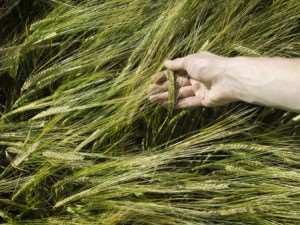By Mauricio Espinoza

Researchers with the College of Food, Agricultural, and Environmental Sciences at The Ohio State University are conducting studies to determine the best weed control strategies for spring barley, a crop that is now getting more attention from farmers due to growth of the craft beer industry in Ohio and neighboring states.
“We are currently in our first year of research to determine the safest and most effective herbicide programs for spring barley in Ohio,” said Mark Loux, an Ohio State University Extension weed specialist. OSU Extension is the statewide outreach arm of the college.
“Summer annual weeds such as ragweeds, lambsquarters, pigweeds and foxtails are the primary weed problem in spring-planted crops, and the competitiveness of the crop with weeds will be affected by planting date and stand density, among other things.”
The spring barley weed control study is taking place at the college’s Western Agricultural Research Station in South Charleston. It includes two different planting dates and different types of herbicide treatments, designed to determine what kind of weed control treatments are needed and what the crop responses and yield are.
Loux said an early April planting date seems to favor competitiveness of barley against weeds that commonly impact spring crops.
“One of the things about barley and crops that can go in that early is that generally the earlier you can put them in, the more competitive they will be with most of the weeds you’re going to deal with that season,” Loux said.
“It’s the same principle that applies to alfalfa and other forages. The later you plant in spring, you are planting right when the weeds are all emerging, so they are going to be more competitive.”
Loux said the early planted barley at the research plots at South Charleston has been outcompeting weeds fairly well so far, but “that’s not to say that when we come back later in the season some of these weeds won’t be poking above the barley or being competitive.”
In terms of types of weeds impacting spring barley, Loux said an important distinction needs to be made between broadleaf weeds and grasses.
“In a grass crop, broadleaf weeds are always the easy ones to control,” he said. “We have a lot of different options. But the grasses are the difficult ones, as you only have a couple of products labeled for barley that will actually control foxtail postemergence and really nothing from a residual standpoint that controls foxtail. So that’s going to be one of your issues.”
“In this trial we are trying to tell whether the barley can outcompete the foxtail effectively enough without a postemergence herbicide. And then we will be looking at differences in control from several broadleaf treatments. Ultimately, we will probably get good control from a bunch of those herbicides, and it will be a matter of whether any of those injure the barley or we have any yield differences.”
Loux said there are a number of herbicides currently registered for use in barley, yet not all labels specifically mention spring barley.
Source:osu.edu